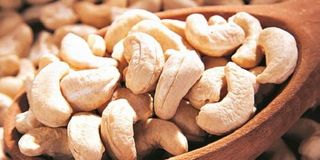Focus on cashews industry as driver of economic growth

Tanzania’s cash crops map has changed drastically in recent times, beginning with the days when the country was the world’s largest producer-cum-exporter of sisal. In due course of time and events, other crops turned the tables on sisal.
For example, according to the International Monetary Fund, coffee next became Tanzania’s most important cash crop – accounting for 17.7 percent of the country’s total agricultural exports by value in 1996. On the other hand, sisal had tumbled to the bottom, accounting for a measly 0.7 percent of the agricultural export earnings.
In-between were cotton (16.3 percent of all agricultural exports income that year); cashew nuts (12.7 percent); tobacco (6.4 percent), and tea (2.9 percent). Then the tables were again turned – and raw tobacco became Tanzania’s most lucrative export crop, with its foreign exchange earnings rising from $169m in 2010 to $318m in 2015.
This was followed by cashew nut exports – whose forex earnings grew from $50m in 2010 to $201m in 2015 – and coffee exports, whose foreign exchange earnings increased from $109m to $162m in the same period.
Most remarkable here is that, while (for example) coffee export earnings grew by 1.4 times in five years – and raw tobacco export earnings nearly doubled – the growth in export earnings for cashew nuts was more than fourfold (400 percent) over the same five-year period!
Whichever way one looks at all this, it’d be most reasonable for the relevant authorities, spearheaded by the government and its related institutions, as well as other stakeholders – including especially private sector players in general, and farmers in particular – to more keenly look at the cashew nuts sub-sector as having great potential to functionally power socio-economic development.
Focus on cashews industry as driver of economic growth
What with one thing leading to another at full tilt, Tanzania’s cashew nut export earnings jumped from$201m (about Sh461b) in 2015 to $340m (Sh780b) in the year to October 31, 2017.
Then the earnings virtually leapfrogged to $575.6m (Sh1.3tr) in the year to October 31, 2018. This is according to the central Bank of Tanzania (BoT), as faithfully reported in our issue of December 20, 2018.
In the event, Tanzania has become the third-largest cashew nuts producer in Africa – only behind top-producers Ivory Coast and Nigeria – and the world’s eighth-biggest producer.
Today, Agriculture minister Japheth Hasunga is deservedly waxing lyrical about the country’s cashew nuts prospects as an effective driver of socio-economic development – thus sidelining past economic kingpins like sisal, coffee and tobacco.
All in all, the government is feverishly working on ways and means of developing the cashew nuts industry, preferably using the public/private partnership (P/PP) model.
We can only wish the government Godspeed as it turns focus on cashews to drive functional industrialisation to a middle-income Economy by Year-2025. But, it must at all times exercise strict control and monitoring to achieve those noble goals.




